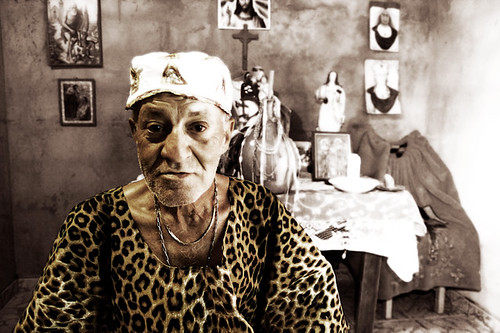Jonathan Fields/Staff Writer
“The past is never dead. It’s not even past.”
These words of Mississippi-born playwright William Faulkner illuminate the racial turmoil of the U.S. in the 1950s. This passage was famously quoted once by President Barack Obama, suggesting this sentiment still holds true even in the 21st century.
Brazil, like the United States, has a troubled history of human rights abuses both with indigenous populations and the African slave trade.
Marcus Vinicius Avelar is a researcher in the field of cultural linguistics who spoke at a presentation at FIU’s Linguistics Colloquium series.
He explained how he has been attempting to answer the question, “Why is it that the past is always so present?”
He has been conducting ethnographic fieldwork in São Paulo, Brazil with an unlikely, and rather interesting community: spirit mediums who practice a hybridized religion called Umbanda.
Umbanda, which has nearly half a million followers in Brazil, incorporates elements of Catholicism and African traditions, as well as “spiritualist” beliefs such as reincarnation and karma.
According to Avelar, research has shown that a significant portion of the Brazilian population believe in reincarnation, including many Jews and Catholics.
“Spiritual evolution” is an important component of the Umbanda religion, according to Avelar. In his research, he worked with spirit mediums who assisted believers in gaining insights into their spiritual progress across a continuum of many lives.
Somewhat surprisingly, the spirits, which these mediums channel, have cultural identities.
These “beings,” who are at the core of Avelar’s ethnographic fieldwork, though phantasmagorical in nature, are said that they identify as either African slaves or as indigenous.
This is much in contrast with today’s Brazil, where the population predominantly identify as having European, indigenous and African heritage together in varying degrees.
In this religion’s ideology of ancestral spirits, time seems to fold backwards on itself, revealing the prickly vestiges of a troubled history.
“Looking at racialized spirits gives a look back at the past,” said Avelar.
The multi-disciplinary approach taken by this researcher incorporates a novel methodology for conceptualizing space and time.
A chronotope is a term used by literary theorists to describe the way we talk about places in time, something somewhat analogous to a historical milieu, for art history majors.
“1980s glam metal”, “1970s disco” or “1950s Cuba” are all easy ways to understand this concept of “temporalities,” or frames of reference in space and time.
“Chronotopes are the intrinsic connectors of temporal and spatial relationships,” Avelar said.
Avelar also discussed the 2016 Trump campaign slogan, “Make America Great Again,” in order to give an example of this concept of chronotopes that might be closer to home for Americans.
He explained that the slogan references a time in history when America was “great,” but the inference drawn by many is a time and place that was less diverse and less inclusive.
Leveraging this frame of reference in space and time became a powerful rhetorical device for President Trump in his 2016 campaign.
“When you start to look at how much these structures of time and space are embedded in narratives, you start to understand how consequential these narratives are,” said Avelar. “You begin to become sensitive to the semiotics of space and time.”
The speaker series is presented by FIU’s linguistic program.
“Our faculty and students are working on topics ranging from the structure of Heritage Spanish in Miami to the Sound System of Hakka, a language spoken in Jamaica,” said Ellen Thompson, the Director of FIU’s Linguistics Program.
Next month, the Linguistics Program will host the eighth annual Barbara Gordon Lecture, sponsored in part by former Florida State Senator Jack Gordon.
This year’s lecture will focus on the phenomenon of code switching, which are looking at cues in speech that indicate power dynamics and social structures.
Jacqueline Toribio, a linguistics professor at The University of Texas in Austin will explain her research on how the Dominican diaspora, “navigate the social classifications that circulate in local ecologies.”
The event will be held at FIU’s Modesto A. Maidique campus on Tuesday, Mar. 17 at 11 a.m. at the FIU College of Business Complex in room 154.
Additionally, Toribio will be giving another presentation on “Spanish-language text in popular literary selections,” at MMC, Tuesday Mar. 17 at 6 p.m. in the Management and Advanced Research Center in room 290.
Students interested in obtaining more information on FIU’s graduate and undergraduate programs in linguistics may contact Ellen Thompson directly.






Be the first to comment on "Racialized Spirits, Time Travel and One Linguist’s Feelings on “Make America Great Again”"